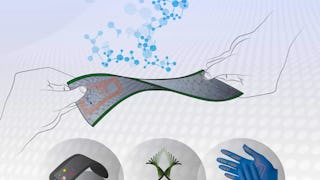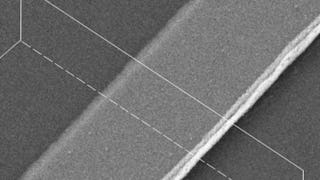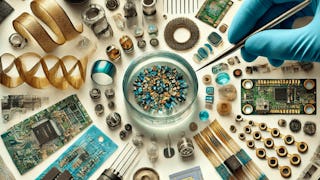Nanotechnology and nanosensors are broad, interdisciplinary areas that encompass (bio)chemistry, physics, biology, materials science, electrical engineering and more. The present course will provide a survey on some of the fundamental principles behind nanotechnology and nanomaterials and their vital role in novel sensing properties and applications. The course will discuss interesting interdisciplinary scientific and engineering knowledge at the nanoscale to understand fundamental physical differences at the nanosensors. By the end of the course, students will understand the fabrication, characterization, and manipulation of nanomaterials, nanosensors, and how they can be exploited for new applications. Also, students will apply their knowledge of nanotechnology and nanosensors to a topic of personal interest in this course.
---------------- COURSE OBJECTIVES The course main objective is to enhance critical, creative, and innovative thinking. The course encourages multicultural group work, constructing international 'thinking tanks' for the creation of new ideas. Throughout the course, you will be asked to reflect upon your learning, think "out of the box", and suggest creative ideas. The course is set to encourage the understanding of: 1. The importance of nanoscale materials for sensing applications. 2. Approaches used for characterizing sensors based nanomaterials. 3. Approaches used for tailoring nanomaterials for a specific sensing application. 4. Metallic and semiconductor nanoparticles. 5. Organic and inorganic nanotubes and nanowires. 6. Optical, mechanical and chemical sensors based on nanomaterials. 7. Hybrid nanomaterial-based sensors. ---------------- We recommend that you read the following supplementary reading materials: -Jiří Janata, Principles of Chemical Sensors, Springer, 2d Edition (1989). -Roger George Jackson, Novel Sensors and Sensing, CRC Press (2004). _ _ _ _ _ _ _ _ _ _ _ _ _ _ _ _ _ _ Teaching Team About Professor Haick Hossam Professor Hossam Haick is an expert in the field of nanotechnology, nanosensors, and non-invasive disease diagnosis. Prof. Haick is the recipient of the prestigious Marie Curie Excellence Award, ERC Award, and the FP-7 Health Award. He is also the recipient of more than 42 international honors and prizes for his achievements, including a Knight of the Order of Academic Palms (conferred by the French Government) and the “List of the World’s Top 35 Young Scientists”, and the Discovery Award of the Bill & Melinda Gates. Prof. Haick is the founder and the leader of a European consortium of eight universities and companies for the development of advanced generation of nanosensors for disease diagnosis. He also serves as an associate editor of the two journals and serves as an advisory consultant to the Chemical Abstracts Service (CAS) – the world's authority for chemical information - a senior scientific advisory member of several national and international companies and institutes, and as a scientific evaluator in the European Commission. Email: hhossam@technion.ac.il _ _ _ _ _ _ _ _ _ _ _ _ _ _ _ _ _ _ Course Staff Meital Bar-Segev, Teaching Assistant: Received her B.A. (Cum Laude) in Chemistry and B.Sc (Cum Laude) in Materials Engineering from the Technion – Israel Institute of Technology (both in 2010). During her studies, she worked in a student position at Tower Semiconductors Ltd. After graduation she worked at Alfred Mann Institute in the Technion (AMIT) as a process development engineer. Currently, she performs her Ph.D. degree (direct track) in the Russell Berrie Nanotechnology Institute (RBNI) of the Technion under the supervision of Prof. Hossam Haick. The research of Meital focuses is the development of electronic skin based on nanoparticles. Abeer Watted, Teaching Assistant: Received her B.Sc. and M.Sc. in Transportation and Highways Engineering from the Technion. She is a Ph.D. student at the Faculty of Education in Science and Technology at the Technion, under the supervision of Asst. Prof. Miri Barak. She received a second master degree in Educatu in Science and Technology from the Technion in 2013. Her research focuses on science education and inquiry-based laboratories. Currently, Abeer works as a lecturer at Al-Qasemi Academic College of Education, where she serves also as the head of Civil Engineering Department. Maya Usher, Teaching Assistant: Received her B.A. and M.A. (Cum Laude) in Communication Studies from Sapir Academic College and Ben Gurion University- Israel (2009; 2013 respectively). Currently, Maya is a PhD. candidate at the Faculty of Education in Science and Technology at the Technion, under the supervision of Asst. Prof. Miri Barak. Her research focuses on examining online collaborative learning in small multicultural groups. Muhammad Khatib, Teaching Assistant: Received his B.Sc in Biochemical Engineering from the Technion – Israel Institute of Technology (2015). His final research project, conducted with Prof. Avi Schroeder, dealt with harnessing liposome-based drug delivery systems to applications in precise agriculture. Currently, he performs his Ph.D. (special track) in the Department of Chemical Engineering of the Technion under the supervision of Prof. Hossam Haick, and his research focuses on self-healing devices for monitoring infectious diseases. Miri Barak, Pedagogical Advisor: Assistant Professor at the Faculty of Education in Science and Technology, Technion- Israel Institute of Technology. She is the Head of the Science and Learning Technologies group and the advisor of graduate students. Her academic activities focus on developing, integrating, and evaluating science education curricula at school and higher education levels. Her studies involve the use of information and communication technologies (ICT), with emphasis on emerging web-2.0 and cloud applications, to foster meaningful learning and high-order thinking.




















